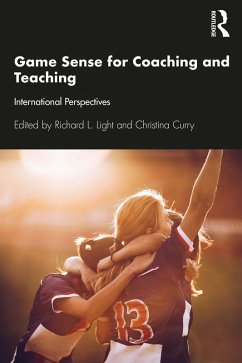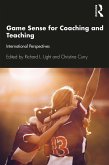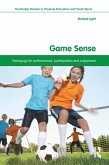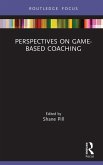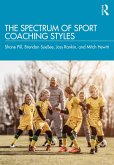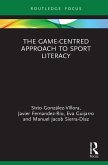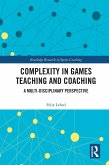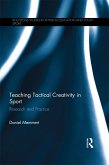Game Sense for Teaching and Coaching (eBook, ePUB)
International Perspectives
Redaktion: Light, Richard; Curry, Christina
39,95 €
39,95 €
inkl. MwSt.
Sofort per Download lieferbar

20 °P sammeln
39,95 €
Als Download kaufen

39,95 €
inkl. MwSt.
Sofort per Download lieferbar

20 °P sammeln
Jetzt verschenken
Alle Infos zum eBook verschenken
39,95 €
inkl. MwSt.
Sofort per Download lieferbar
Alle Infos zum eBook verschenken

20 °P sammeln
Game Sense for Teaching and Coaching (eBook, ePUB)
International Perspectives
Redaktion: Light, Richard; Curry, Christina
- Format: ePub
- Merkliste
- Auf die Merkliste
- Bewerten Bewerten
- Teilen
- Produkt teilen
- Produkterinnerung
- Produkterinnerung

Bitte loggen Sie sich zunächst in Ihr Kundenkonto ein oder registrieren Sie sich bei
bücher.de, um das eBook-Abo tolino select nutzen zu können.
Hier können Sie sich einloggen
Hier können Sie sich einloggen
Sie sind bereits eingeloggt. Klicken Sie auf 2. tolino select Abo, um fortzufahren.

Bitte loggen Sie sich zunächst in Ihr Kundenkonto ein oder registrieren Sie sich bei bücher.de, um das eBook-Abo tolino select nutzen zu können.
Game Sense for Coaching and Teaching provides an understanding of how an Australian approach to coaching has grown and developed as it is taken up across the globe. It also offers insights into how any coaching or PE teaching approach changes as it is adapted to different contexts across the world.
- Geräte: eReader
- mit Kopierschutz
- eBook Hilfe
Andere Kunden interessierten sich auch für
![Game Sense for Teaching and Coaching (eBook, PDF) Game Sense for Teaching and Coaching (eBook, PDF)]() Game Sense for Teaching and Coaching (eBook, PDF)39,95 €
Game Sense for Teaching and Coaching (eBook, PDF)39,95 €![Game Sense (eBook, ePUB) Game Sense (eBook, ePUB)]() Richard LightGame Sense (eBook, ePUB)48,95 €
Richard LightGame Sense (eBook, ePUB)48,95 €![Perspectives on Game-Based Coaching (eBook, ePUB) Perspectives on Game-Based Coaching (eBook, ePUB)]() Perspectives on Game-Based Coaching (eBook, ePUB)22,95 €
Perspectives on Game-Based Coaching (eBook, ePUB)22,95 €![The Spectrum of Sport Coaching Styles (eBook, ePUB) The Spectrum of Sport Coaching Styles (eBook, ePUB)]() Shane PillThe Spectrum of Sport Coaching Styles (eBook, ePUB)39,95 €
Shane PillThe Spectrum of Sport Coaching Styles (eBook, ePUB)39,95 €![The Game-Centred Approach to Sport Literacy (eBook, ePUB) The Game-Centred Approach to Sport Literacy (eBook, ePUB)]() Sixto González-VílloraThe Game-Centred Approach to Sport Literacy (eBook, ePUB)25,95 €
Sixto González-VílloraThe Game-Centred Approach to Sport Literacy (eBook, ePUB)25,95 €![Complexity in Games Teaching and Coaching (eBook, ePUB) Complexity in Games Teaching and Coaching (eBook, ePUB)]() Felix LebedComplexity in Games Teaching and Coaching (eBook, ePUB)43,95 €
Felix LebedComplexity in Games Teaching and Coaching (eBook, ePUB)43,95 €![Teaching Tactical Creativity in Sport (eBook, ePUB) Teaching Tactical Creativity in Sport (eBook, ePUB)]() Daniel MemmertTeaching Tactical Creativity in Sport (eBook, ePUB)47,95 €
Daniel MemmertTeaching Tactical Creativity in Sport (eBook, ePUB)47,95 €-
-
-
Game Sense for Coaching and Teaching provides an understanding of how an Australian approach to coaching has grown and developed as it is taken up across the globe. It also offers insights into how any coaching or PE teaching approach changes as it is adapted to different contexts across the world.
Dieser Download kann aus rechtlichen Gründen nur mit Rechnungsadresse in A, B, BG, CY, CZ, D, DK, EW, E, FIN, F, GR, HR, H, IRL, I, LT, L, LR, M, NL, PL, P, R, S, SLO, SK ausgeliefert werden.
Produktdetails
- Produktdetails
- Verlag: Taylor & Francis eBooks
- Seitenzahl: 250
- Erscheinungstermin: 15. März 2021
- Englisch
- ISBN-13: 9781000364255
- Artikelnr.: 61097829
- Verlag: Taylor & Francis eBooks
- Seitenzahl: 250
- Erscheinungstermin: 15. März 2021
- Englisch
- ISBN-13: 9781000364255
- Artikelnr.: 61097829
- Herstellerkennzeichnung Die Herstellerinformationen sind derzeit nicht verfügbar.
Richard L. Light is author of Game Sense: Pedagogy for participation performance and enjoyment (2013, Routledge) and Professor of Sport Coaching in the College of Education, Health and Human Development at the University of Canterbury, New Zealand. He is a prominent international figure working in sport pedagogy with a focus on athlete-centred approaches. He is well known for his research and writing on Game Sense over the past twenty years and has published many high impact research books on sport coaching and learning. His most recent books include: Applied Positive Pedagogy in sport coaching (2021, Routledge) and Positive Pedagogy for sport coaching (2nd edn) (2019, Routledge), both with Stephen Harvey; Stories of Indigenous success in Australian sport: Journeys to the AFL and NRL, with John Evans (2018, Palgrave MacMillan); and Positive Pedagogy for sport coaching: Athlete-centred coaching for individual sports (2017, Routledge). Christina Curry PhD is a former Head of Health and Physical Education Department at a secondary school in Sydney, Australia. She completed a PhD in 2013 on the implementation of Teaching Games for Understanding (TGfU) at an independent secondary school in Sydney. She is at Western Sydney University, Australia, where she was Director of Secondary Education and now teaches and conducts research on Leadership, Health and Physical Education, with a focus on Game Sense. She is regularly invited to conduct workshops on Game Sense and Positive Pedagogy for sport coaching, and was involved in its early development.
Introduction
1. Game Sense: Its History, Development and Future
Part 1: Theorizing Game Sense
2. Humanism and Holism: The Philosophical Foundations of Game Sense
3. Reconciling Approaches: Informing Game Sense Coaching Pedagogy with a
Constraints-led Perspective
4: The Body and Learning through Game Sense
Part 2: Game Sense and Culture
5. Game Sense, Culture and Learning: A Focus on Asia
6. The Influence of Context on Teachers' and Coaches' Use of GBA
7. The Influence of Games and Culture on Indigenous AFL and NRL Players'
Development of Expertise
8. Adapting a Game Sense Approach to Coaching Rugby in Chile
9. Ako and Indigenous Athletes: Kaupapa M¿ori Principles and Game Sense
Pedagogy
Part 3: Coaching and Teaching Issues in Game Sense
10. Teaching Decision-making and Creativity as a Vital Issue for Teacher
Education - A Qualitative Intervention Study with German Trainee Teachers
11. A Bigger Picture: Aligning Game Sense with Curriculum Standards
12. Discovering Game Shape through Cooperative Team Adventures
13. English and Australian Teachers' Interpretation and Use of GBA
14. What Do Children Learn from the Game? A Study of Elementary Physical
Education in Aichi, Japan
15. Applied Game Sense and Positive Pedagogy in High School Rugby
16. The Utility of Game Sense for PE Teachers, Sport Coaches and
Policy-makers: A Models Based Narrative
Part 4: The Development of Game Sense
17. Implementing TGfU in an Australian Independent School: An Affective
Journey
18. The Use of Coaching Pods for Coach Education in Croquet Coaching Pods:
Possibilities for Game Sense
19. What's in a Name? The Influence of Game Sense on a New Zealand
Basketball Coach's Practice
20. From the Games Concept Approach to Game Sense to Positive Pedagogy: My
Pedagogical Journey
21. Learning from Adaptation Games in a Japanese Basketball Unit
Concluding Thoughts: Game Sense for Teaching and Coaching Globally
1. Game Sense: Its History, Development and Future
Part 1: Theorizing Game Sense
2. Humanism and Holism: The Philosophical Foundations of Game Sense
3. Reconciling Approaches: Informing Game Sense Coaching Pedagogy with a
Constraints-led Perspective
4: The Body and Learning through Game Sense
Part 2: Game Sense and Culture
5. Game Sense, Culture and Learning: A Focus on Asia
6. The Influence of Context on Teachers' and Coaches' Use of GBA
7. The Influence of Games and Culture on Indigenous AFL and NRL Players'
Development of Expertise
8. Adapting a Game Sense Approach to Coaching Rugby in Chile
9. Ako and Indigenous Athletes: Kaupapa M¿ori Principles and Game Sense
Pedagogy
Part 3: Coaching and Teaching Issues in Game Sense
10. Teaching Decision-making and Creativity as a Vital Issue for Teacher
Education - A Qualitative Intervention Study with German Trainee Teachers
11. A Bigger Picture: Aligning Game Sense with Curriculum Standards
12. Discovering Game Shape through Cooperative Team Adventures
13. English and Australian Teachers' Interpretation and Use of GBA
14. What Do Children Learn from the Game? A Study of Elementary Physical
Education in Aichi, Japan
15. Applied Game Sense and Positive Pedagogy in High School Rugby
16. The Utility of Game Sense for PE Teachers, Sport Coaches and
Policy-makers: A Models Based Narrative
Part 4: The Development of Game Sense
17. Implementing TGfU in an Australian Independent School: An Affective
Journey
18. The Use of Coaching Pods for Coach Education in Croquet Coaching Pods:
Possibilities for Game Sense
19. What's in a Name? The Influence of Game Sense on a New Zealand
Basketball Coach's Practice
20. From the Games Concept Approach to Game Sense to Positive Pedagogy: My
Pedagogical Journey
21. Learning from Adaptation Games in a Japanese Basketball Unit
Concluding Thoughts: Game Sense for Teaching and Coaching Globally
Introduction
1. Game Sense: Its History, Development and Future
Part 1: Theorizing Game Sense
2. Humanism and Holism: The Philosophical Foundations of Game Sense
3. Reconciling Approaches: Informing Game Sense Coaching Pedagogy with a
Constraints-led Perspective
4: The Body and Learning through Game Sense
Part 2: Game Sense and Culture
5. Game Sense, Culture and Learning: A Focus on Asia
6. The Influence of Context on Teachers' and Coaches' Use of GBA
7. The Influence of Games and Culture on Indigenous AFL and NRL Players'
Development of Expertise
8. Adapting a Game Sense Approach to Coaching Rugby in Chile
9. Ako and Indigenous Athletes: Kaupapa M¿ori Principles and Game Sense
Pedagogy
Part 3: Coaching and Teaching Issues in Game Sense
10. Teaching Decision-making and Creativity as a Vital Issue for Teacher
Education - A Qualitative Intervention Study with German Trainee Teachers
11. A Bigger Picture: Aligning Game Sense with Curriculum Standards
12. Discovering Game Shape through Cooperative Team Adventures
13. English and Australian Teachers' Interpretation and Use of GBA
14. What Do Children Learn from the Game? A Study of Elementary Physical
Education in Aichi, Japan
15. Applied Game Sense and Positive Pedagogy in High School Rugby
16. The Utility of Game Sense for PE Teachers, Sport Coaches and
Policy-makers: A Models Based Narrative
Part 4: The Development of Game Sense
17. Implementing TGfU in an Australian Independent School: An Affective
Journey
18. The Use of Coaching Pods for Coach Education in Croquet Coaching Pods:
Possibilities for Game Sense
19. What's in a Name? The Influence of Game Sense on a New Zealand
Basketball Coach's Practice
20. From the Games Concept Approach to Game Sense to Positive Pedagogy: My
Pedagogical Journey
21. Learning from Adaptation Games in a Japanese Basketball Unit
Concluding Thoughts: Game Sense for Teaching and Coaching Globally
1. Game Sense: Its History, Development and Future
Part 1: Theorizing Game Sense
2. Humanism and Holism: The Philosophical Foundations of Game Sense
3. Reconciling Approaches: Informing Game Sense Coaching Pedagogy with a
Constraints-led Perspective
4: The Body and Learning through Game Sense
Part 2: Game Sense and Culture
5. Game Sense, Culture and Learning: A Focus on Asia
6. The Influence of Context on Teachers' and Coaches' Use of GBA
7. The Influence of Games and Culture on Indigenous AFL and NRL Players'
Development of Expertise
8. Adapting a Game Sense Approach to Coaching Rugby in Chile
9. Ako and Indigenous Athletes: Kaupapa M¿ori Principles and Game Sense
Pedagogy
Part 3: Coaching and Teaching Issues in Game Sense
10. Teaching Decision-making and Creativity as a Vital Issue for Teacher
Education - A Qualitative Intervention Study with German Trainee Teachers
11. A Bigger Picture: Aligning Game Sense with Curriculum Standards
12. Discovering Game Shape through Cooperative Team Adventures
13. English and Australian Teachers' Interpretation and Use of GBA
14. What Do Children Learn from the Game? A Study of Elementary Physical
Education in Aichi, Japan
15. Applied Game Sense and Positive Pedagogy in High School Rugby
16. The Utility of Game Sense for PE Teachers, Sport Coaches and
Policy-makers: A Models Based Narrative
Part 4: The Development of Game Sense
17. Implementing TGfU in an Australian Independent School: An Affective
Journey
18. The Use of Coaching Pods for Coach Education in Croquet Coaching Pods:
Possibilities for Game Sense
19. What's in a Name? The Influence of Game Sense on a New Zealand
Basketball Coach's Practice
20. From the Games Concept Approach to Game Sense to Positive Pedagogy: My
Pedagogical Journey
21. Learning from Adaptation Games in a Japanese Basketball Unit
Concluding Thoughts: Game Sense for Teaching and Coaching Globally
